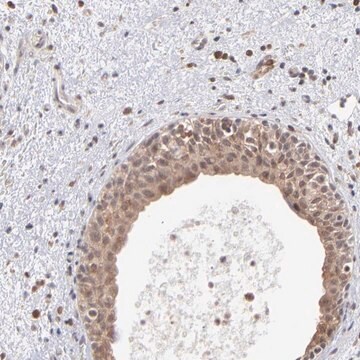MABC943
Anti-OAS1 Antibody, clone 1D11.1
clone 1D11.1, from mouse
Synonyme(s) :
2′-5′-oligoadenylate synthase 1, (2-5′)oligo(A) synthase 1, 2-5A synthase 1, E18/E16, p46/p42 OAS
About This Item
Produits recommandés
Source biologique
mouse
Niveau de qualité
Forme d'anticorps
purified antibody
Type de produit anticorps
primary antibodies
Clone
1D11.1, monoclonal
Espèces réactives
human
Technique(s)
western blot: suitable
Isotype
IgG2aκ
Numéro d'accès NCBI
Numéro d'accès UniProt
Modification post-traductionnelle de la cible
unmodified
Informations sur le gène
human ... OAS1(4938)
Description générale
Spécificité
Immunogène
Application
Apoptosis & Cancer
RNA Metabolism & Binding Proteins
Qualité
Western Blotting Analysis: A 1:500 dilution of this antibody detected OAS1 in 10 µg of lysate from IFN gamma-treated HeLa cells.
Description de la cible
Forme physique
Stockage et stabilité
Autres remarques
Clause de non-responsabilité
Not finding the right product?
Try our Outil de sélection de produits.
Code de la classe de stockage
12 - Non Combustible Liquids
Classe de danger pour l'eau (WGK)
WGK 1
Point d'éclair (°F)
Not applicable
Point d'éclair (°C)
Not applicable
Certificats d'analyse (COA)
Recherchez un Certificats d'analyse (COA) en saisissant le numéro de lot du produit. Les numéros de lot figurent sur l'étiquette du produit après les mots "Lot" ou "Batch".
Déjà en possession de ce produit ?
Retrouvez la documentation relative aux produits que vous avez récemment achetés dans la Bibliothèque de documents.
Notre équipe de scientifiques dispose d'une expérience dans tous les secteurs de la recherche, notamment en sciences de la vie, science des matériaux, synthèse chimique, chromatographie, analyse et dans de nombreux autres domaines..
Contacter notre Service technique







